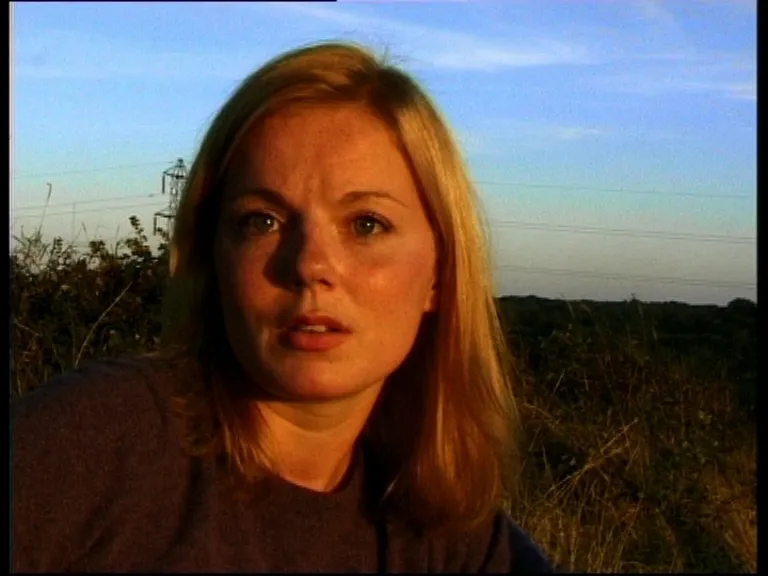GERI

Molly Dineen's Geri (May 1999, Channel 4) is one of the most effective and poignant documentaries about the peculiar and transient lifestyle of pop stardom. It provides a surprisingly deep insight into the endless merry-go-round of restless attention-seeking and private insecurities, including a pronounced fear of being alone and dying—fears that Geri Halliwell, the subject, seems to suffer from all too acutely.
In one early scene, the ex-Spice Girl describes in morbid detail seeing her father’s dead body in the morgue, comparing it to the Penguin from Batman, with sunken eyes and black fingernails. This stark contrast between mortality and the forever-young bubblegum pop culture she inhabits is a testament to Dineen's skill at peeling back the celebrity mask to reveal the all-too-human being beneath.
Of course, in today’s over-saturated age of content creators and social influencers—where so many more people can chase fame via their camera phones—this film might seem a bit quaint, dating all the way back to 1999. Yet, in light of Liam Payne's tragic death last week, there seem to be lasting lessons here.
One striking aspect of Halliwell's post-Spice Girls existence in the documentary is how lost she seems without the safety net of the girl group, yet she fearlessly flies toward solo ambitions she hasn’t properly defined—like a jet plane that's off course. At times, it seems that both Halliwell and the press share a mutualistic relationship, each fearing they will lose the public's attention. In many ways, Geri's quest for perpetual fame seems like a moth drawn to a flame like so many stars before her. In one symbolic moment, Geri imitates Marilyn Monroe by singing 'Happy Birthday' to Prince Charles at his 50th Birthday Gala in London—reminiscent of the screen actress’s famous performance for JFK in May 1962, just a few months before her tragic death that same year.
In more intimate moments, we see Halliwell with her mother and close friend. They come across as grounded, in stark contrast to her own anxious energy, showing no sign of envy toward her global fame. Ironically, Halliwell desperately seeks their approval with each PR stunt and event she attends, and she is devastated whenever they don’t dutifully acknowledge her day-to-day achievements. The paranoia of her insecurity is palpable, and she seems driven more by fear of being forgotten than by any sense of comfort in her own identity when out of the spotlight.
This "Baby Jane" psychology is typical of celebrities, though Halliwell deserves credit for being so candid about her insecurities on camera. Dineen's directorial brilliance can be seen in her ability to capture Geri's off-guard moments so deftly, like shining pearls of documentary observation. One standout scene occurs when Halliwell visits a Disney store in Times Square after attending a United Nations meeting to discuss reproductive health in poorer nations. There, she encounters a mesmerised young girl, starstruck by the sight of a Spice Girl. This moment perfectly illustrates the parallel between Halliwell (a grown woman) and the child—they are both shopping for princess dresses and entranced by fantasy. Halliwell's arrested development is like a spell keeping her from confronting the emptiness she fears will envelop her when her fame ultimately fades. Her recognition of life's grim realities, particularly after seeing her father's corpse in the mortuary, only intensifies her retreat into an illusionary world where she can forever play the princess.
Halliwell's later conversation with Dineen in the back of a New York Taxi, where she expresses her fear of one day losing her mother and being made an adult orphan, further emphasises her mortal anxieties and helps explain her hyperactive flitting from one event or project to the next—anything to distract from the terror of being all alone in the world and forgotten.

Another particularly touching scene occurs at a dog rescue shelter, where Halliwell breaks down in tears upon seeing an old dog with watery eyes that no one seems to want to take home with them. Visually, this perfectly captures her fears about her own future, both personally and professionally. It's also strangely moving to see her then find comfort in the arms of her friend, George Michael (sadly no longer with us) who has accompanied her to adopt a dog of her own. Knowing that he would later end up ruined by the pitfalls of fame again serves as an unconscious foreshadowing in this cautionary tale of a film.
Clearly walking the tightrope of fame isn’t for everyone. Since this film first aired in 1999, Halliwell has come a long way from the lost star who had just quit the Spice Girls, adjusting to the highs and lows of celebrity. Unfortunately, Liam Payne (of One Direction) was unable to escape the perils of fame and paid the ultimate price with his life just last week in Buenos Aires. Personally, I would have probably been indifferent about his demise had it not been for my daughter's teenage love of One Direction back when they were conquering the charts. It's interesting to observe that, as she's grown older, she has noticed (most likely) through her social media feeds that all that glitters is not gold—a sign of our digital times, where there is more scrutiny on famous people and their flaws and even fewer places to hide them.